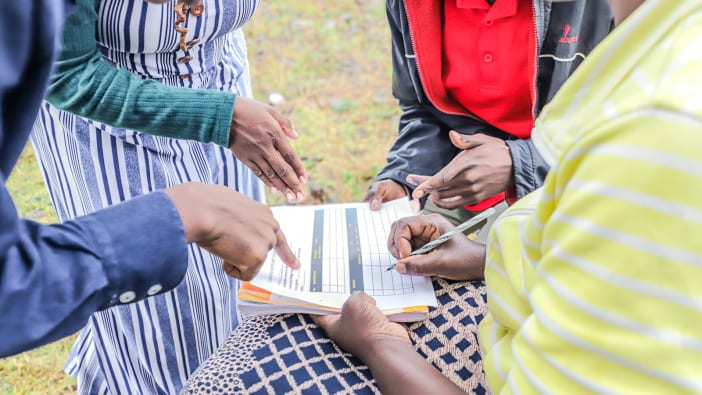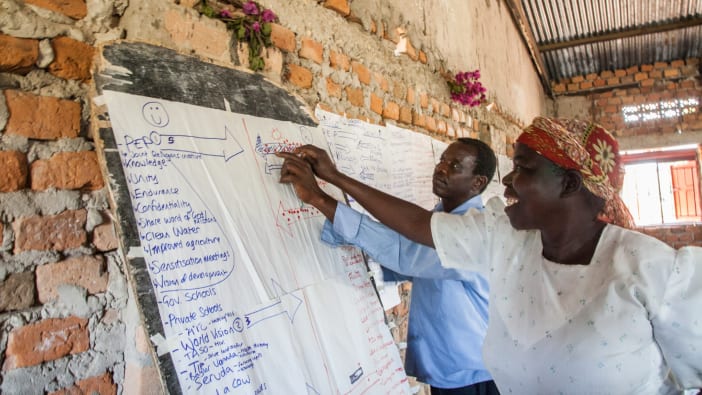Many people continue to become HIV infected, despite all the work in HIV/AIDS education carried out by many organisations. (However, in Uganda the figures are no longer increasing, showing the effectiveness of AIDS education there.) It is clear that though people’s understanding has increased, resulting changes in behaviour still follow a long way behind. PLA sessions were conducted in Lungwena area, Mangochi in Malawi to find out how much people know about AIDS. In the eight villages we visited, the key we used was ‘big ears to listen, big eyes to see and a small mouth to speak’.
Notes on using PLA were made, to help group members in gathering information about:
- village origins
- traditional healers – their availability and use
- past and present common diseases of the villages
- comparing past and present deaths
- possible causes of other new diseases
- problems faced by the community and help needed.
Social mapping
The villagers made a map of the village on the ground and identified houses where one or both parents were dead and noted the number of orphans living there. People considered the consequences of the high numbers of orphans and how to tackle the problem.
Social structure
Our members asked about marriage customs. They found out the age of marriage for men and women, number of sexual partners and customs used when a husband or wife dies. They asked about initiation, learning how often equipment used for circumcision was re-sterilised. They encouraged people to make a calendar of their activities during both the night and day. They asked about fish buyers and how long they stayed by the lake shores, as these people are known to offer money for sexual favours.
The response
For at least 20% of the PLA exercises we were unable to get sufficient participation from women, younger children and, in some cases, men.
At first, villagers thought we were experts with modern information. They thought we were there to tell them what to do and would probably want them to adopt strange customs. In due course, our friendliness and sitting on the ground together helped them realise that we were there to learn and work together with them.
We found people avoided talking about sex and AIDS because they related sex to joy, fame, freedom and fertility. Although they realised sexual behaviour could be dangerous because of AIDS, they usually denied that death was mostly due to AIDS, instead blaming chitega (a disease believed to exist in this area, transmitted to adults through witchcraft and sex). This was despite the increase in number of sick people, deaths and orphans.
Other reasons given were women who were blamed for being ‘weak’ in their morals, the unavailability of condoms, and fish buyers. Some blamed the health centre for not providing enough practical care and support. They told us that due to poverty, people continue their immoral behaviour although they could identify the risks.
The results
Identifying orphaned houses brought problems because after our sessions people thought they would receive relief items (probably why in some cases we had inflated figures). Several wrong ideas were corrected and the most important points about AIDS shared amongst us. However the social integration of HIV-infected people and their families still remains very poor.
For our health centre the PLA sessions have been very useful because HIV/AIDS awareness activities for the public have resulted. Each village has now identified one resource person to be trained in HIV/AIDS counselling.
Maclean F M Sosono works at the Lungwena Health Centre, PO Box 230, Mangochi, Malawi.









